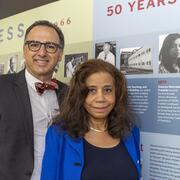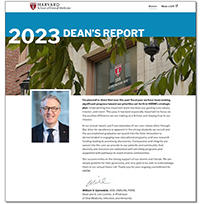
Fifty years ago, Dolores Mercedes Franklin, DMD74, PD76, became the first woman of color to attend Harvard School of Dental Medicine and one of the first five women to earn a DMD degree. A trailblazer throughout her life, Franklin, a global leader in oral health policy, achieved many firsts in her career, paving the way for future generations of women and individuals of color in dentistry.
Today, she sees a pressing need to address racial inequities in oral health care in light of COVID-19. She envisions a path to equity for underrepresented racial minorities in dentistry through scholarship. The Freeman, Grant, Franklin Scholarship bearing her name pays tribute to her and other prominent Black figures in HSDM’s history.
Making History
A native of Washington, D.C., one of the earliest defining moments for Franklin came at age six. “In 1954 shortly after the U.S. Supreme Court ruled on school desegregation I enrolled in an all-white school as a first grader. This integration experiment was a moment that defined my consciousness about race and social injustice,” said Franklin. “My father, an economist and publisher, coincidentally happened to be research director for the DNC during Adlai Stevenson’s 1952 campaign for President.”
 She graduated from Barnard College and in 1970, was admitted to HSDM at the height of the Civil Rights Movement and the Women’s Liberation Movement. “I was the first double minority,” she said. “My class size was 18. The minority students for the classes entering in 1969 and 1970—three women and six Blacks—stood on the shoulders of two Black men admitted in the 1860s and two white women admitted in the 1950s.”
She graduated from Barnard College and in 1970, was admitted to HSDM at the height of the Civil Rights Movement and the Women’s Liberation Movement. “I was the first double minority,” she said. “My class size was 18. The minority students for the classes entering in 1969 and 1970—three women and six Blacks—stood on the shoulders of two Black men admitted in the 1860s and two white women admitted in the 1950s.”
At HSDM, assistant dean James Mulvihill, DMD66, PD69, was her mentor. “National health insurance was fiercely debated, inspiring me to pursue an impactful career in health policy. During my fourth year, I also earned an MPH in a dual-degree program with Columbia University,” she said. “Having grown up in a family of dentists and physicians, I had no clue that women were not in dentistry, or that I would become a torchbearer.”
A Career of Firsts
Franklin went on to a career in dentistry that spanned the fields of academia, business, research, and health policy. In all these roles she brought with her a passion ignited at HSDM to foster global leaders and improve human health.
At age 28, she was appointed assistant dean for Student Affairs (and Admissions, later) at New York University (NYU). She was the first woman, or person of color, from Harvard to hold a dean’s level position in a U.S. dental school, and also one of the youngest and first women. She was NYU’s first Black or woman dental dean.
“In every challenge, I was breaking through the glass ceilings for both gender and race,” Franklin said. “I was the first woman, or person of color, to hold the top-ranking dentist executive position in a Fortune 500 company when I led Professional Services and Research for Sterling Drug, Inc., Cook-Waite Laboratories.”
She authored the updated Cook-Waite textbook, Manual of Local Anesthesia in Dentistry, last revised 33 years before and used extensively in dental schools nationwide. She was also a consultant to the Colgate Palmolive Company.
From there she would take on national roles in health policy leadership positions. She oversaw the National Dental Program for Job Corps, operated in 43 states mainly by major companies.
“In my role at the forefront of the battle against oral cancer, I launched an innovative prevention and control program for the Commission of Public Health in the nation’s capital, for dentists and physicians to confront the highest oral cancer mortality rate in the United States,” she said.
She was then appointed assistant health commissioner in New York City, the top-ranking dentist position, leading Oral Health, Programs and Policy for the nation’s largest city with a dual reporting line to NYC Health and Hospitals Corporation, the nation’s largest public health care system, to integrate oral health services. She was concurrently a clinical professor at NYU. She is president of Franklin-DeLoach Group, Inc., a boutique research and consulting company.
“Throughout my career, I have advocated for oral health as integral to systemic health and worked across medical disciplines.”
Giving Back to the Community
Franklin is an active HSDM alumna who has given her time to enrich the HSDM community. She served as Harvard Dental Alumni Association president, and was a board member of the Harvard Alumni Association. She was a recipient of the HSDM Distinguished Alumni Award, and of the Harvard University Alumni Achievement Award for Excellence in Dental Medicine from the Harvard Alumni Association and the Harvard Black Alumni Society.
“The connections with alumni and the University are lifelong benefits,” she said.
In the aftermath of Hurricane Katrina, she volunteered for reconstruction efforts with Harvard Serves, and medical relief efforts to aid New Orleans residents— merging her professional expertise with philanthropy.
More recently, she’s turned her attention to philanthropic efforts around the Freeman, Grant, Franklin Scholarship. The scholarship is named for Dr. Robert T. Freeman, DMD1869, HSDM’s first Black graduate and the first Black man to graduate with a dental degree in the U.S.; Dr. George F. Grant, DMD1870, Harvard University’s first Black faculty member; and Franklin herself, HSDM’s first Black woman DMD graduate in 1974.
“The scholarship is a decisive step forward in the struggle to achieve our longstanding goal of equity for predoctoral students from underrepresented racial minorities in dentistry,” said Franklin. “It holds the promise of attracting highly-qualified students with financial need and preparing them to be global leaders—leaders in their fields dedicated to improving human health, and in doing so, addressing health disparities.”
At a time when the COVID-19 pandemic has laid bare stark health disparities, Franklin finds even greater urgency in addressing racial inequities in oral health care. “Black communities are struck disproportionately hard by the pandemic accounting for 33 percent of COVID-19 cases,” she said.
“The huge workforce imbalance for Black dentists affects the same communities with a higher prevalence of two COVID-19 comorbidities, diabetes and cardiovascular disease.”
“Notably, the consequences of disparities in access to oral health care lead to diabetes and cardiovascular disease. Black communities have a higher prevalence of periodontal disease. Diabetes, a periodontal disease risk factor, has a bi-directional relationship with periodontitis, and there are associations between periodontitis and cardiovascular disease.”
“Blacks make up 12 percent of the population but only 3.7 percent of active dentists, a significant shortage reflecting low dental school enrollment. Moreover, a disproportionate 26 percent of Black dentists’ patients are medically compromised diabetics—more than double the U.S. prevalence of 11 percent.”
“Remediating the workforce imbalance for Black dentists is a vital strategy to increase access to oral health care, a systemic issue affecting health outcomes for vulnerable and underserved populations.”
“Our 21st century students are entering a profession when there still exists an underserved population—a dire separation of those who have oral health needs and those who have access to care. It is crucial for us to confront the health crisis and support underrepresented racial minority students through predoctoral scholarships.”


